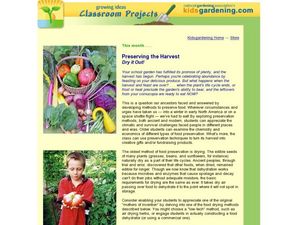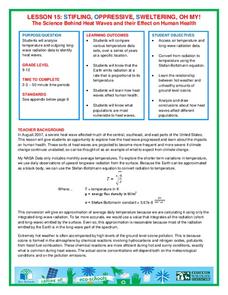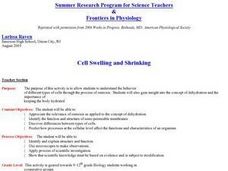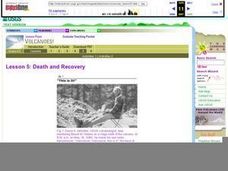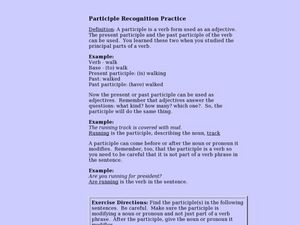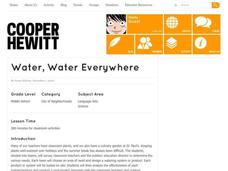Alabama Learning Exchange
Light, Dry and Nutritious - A Look at Dehydrated Food
Fifth graders study dehydration and dehydration of foods. They measure the amount of water lost from fruits as they are dehydrated. They use desktop publishing software to design an advertisement for dehydrated fruit after researching...
Curated OER
Solar Energy - Dehydration
Sixth graders explore process of drying food using solar energy. They cook and/or dry food such as pumpkins, watermelon, corn, and deer meat, explain how solar energy changes foods, and compare and contrast solar energy with other forms...
Curated OER
Preserving the Harvest: Dry it Out!
Students explore how people preserved their food in the past. In food preservation lesson, students create different models that enable someone to dry out food, such as a food dehydrator. Students also learn how to prepare different...
Curated OER
People and Space
Students explore space travel. In this space science lesson, students define "dehydration" and explain why dehydrated foods are necessary for space survival. Students prepare and eat a meal that includes a variety of dehydrated foods.
Curated OER
Nutrition in Space
Students compare and contrast the process of dehydration with the processes of freezing and canning. They predict energy sources that may be accessible in the future in different environments such as the moon and planets, most notably Mars.
Curated OER
People and Space
Young scholars eat dehydrated foods that the astronauts would eat in space. In this dehydrated foods lesson plan, students make lists of food they could eat, discuss how dehydration takes place, eat food, and complete discussion questions.
Science Friday
Sublime Sublimation
Dry ice isn't dehydrated water, and young scientists learn why in this fascinating presentation. After watching a video, they complete three different activities using dry ice. Upon completion, they discuss the scientific principle.
Virginia Department of Education
Solution Concentrations
What happens when you combine 6.022 times 10 to the 23 piles of dirt into one? You make a mountain out of a mole hill. Scholars use dehydration to obtain percent composition and then calculate the molarity of the original solution.
Curated OER
Survival: The Human Body in Extreme Environments
Students create a list of signs the human body gives during threatening weather conditions. They investigate the causes and conditions of dehydration, overheating, and hypothermia.
National Wildlife Federation
Stifling, Oppressive, Sweltering, Oh My!
Looking for a hot date? Pick any day in August, statistically the hottest month in the United States. The 15th lesson in the series of 21 instructs pupils to investigate the August 2007 heat wave through NASA data, daily temperature...
Curated OER
Vocational: Candy or Medicine?
Students investigate methods of differentiating between candy, such as Tic Tacs, and actual pills. When caring for children, they discover the importance of keeping all medications, especially those which look like candy, in a safe...
Curated OER
Cell Swelling and Shrinking
Students examine the concept of osmosis in relation to dehydration. They identify the function and structure of semi-permable membranes. They predict how certain processes can affect the characteristics of an organism.
Curated OER
Water/Hydration
Students develop an understanding of the role water has in the body and the importance of getting enough water each day. Through the lesson, students recognize the risks and signs of dehydration. Also, they identify foods with high...
Curated OER
What's the Matter with My Orange?
Students use oranges to informally explore decomposition, dehydration, fermentation, the water cycle, bacteria, yeast, food webs, the needs of living things, and physical vs. chemical change over a period of three or more months.
Curated OER
Post-Nuclear War Survival
Students use critical thinking and discussion to solve a problempresented in a hypothetical dilemma.
Curated OER
Synthesis
In this synthesis of organic compounds worksheet, students show the steps used to make compounds using toluene, benzene, straight chain carboxylic acid and alkyl halide. They include reagents needed and they show all structures in their...
NOAA
Watch the Screen!
Can a sponge cure cancer? Life science pupils visit the drugstore under the sea in the fifth activity of six. Working groups research the topic then get hands-on experience by testing the inhibiting effects of several plant extracts on...
Perkins School for the Blind
Human Body Regulation
The human body can regulate itself through sweating and resting. Learners with visual impairments discuss how the body changes when it is under stress and what it does to regulate itself. To start, kids use talking thermometers to take...
Curated OER
Bears and Panthers Aplenty: Early Settlers Make a Home in Arkansas
Young historians research the Southwest Trail, which ran through Arkansas back in the 19th century. Pupils are divided into four groups. Each group researches a pioneer who blazed the Southwest Trail. Then, the group presents an oral or...
Chymist
Esters: An Introduction to Organic Chemistry Reactions
Scratch and sniff an introduction to organic chemical reactions. A creative lesson has individuals study the esters commonly used in scratch-and-sniff stickers and advertisements. Following the lab procedure, scholars create the organic...
Curated OER
Death and Recovery
Mount St. Helens erupted on May 18, 1980, devastating plant and animal life for miles around. Two activities are included in this lesson plan. In one, learners evaluate tree rings to determine the age of a tree and the year of a volcano....
Desert Discoveries
Desert Tortoise: Fact or Fiction?
Here is a good game that will determine which team knows the most about the Sonoran Desert tortoise. There are 16 questions posed, and the answers are printed in bold for the benefit of the teacher. Question # 16 reads, "Desert tortoise...
Curated OER
Participles
In this recognizing participles in sentences worksheet, students read definitions and examples of participle usage, read statements, identify one or two participles, and write the noun or pronoun they modify. Students write 34 answers.
Curated OER
Water, Water Everywhere
Students devise a system for watering classroom plants during school year and summer breaks. In this watering system lesson, students work in teams to investigate water needs of plants and develop systems that will keep the plants...
Other popular searches
- Dehydration Synthesis
- Water Dehydration
- Dehydration Hydrolysis
- Health Dehydration
- Food Dehydration
- Nutrition Dehydration
- Dehydration Experiment
- Sports Dehydration
- Dehydration Electrolytes
- Dehydration of Sugar
- Body Water Dehydration
- Signs of Dehydration




